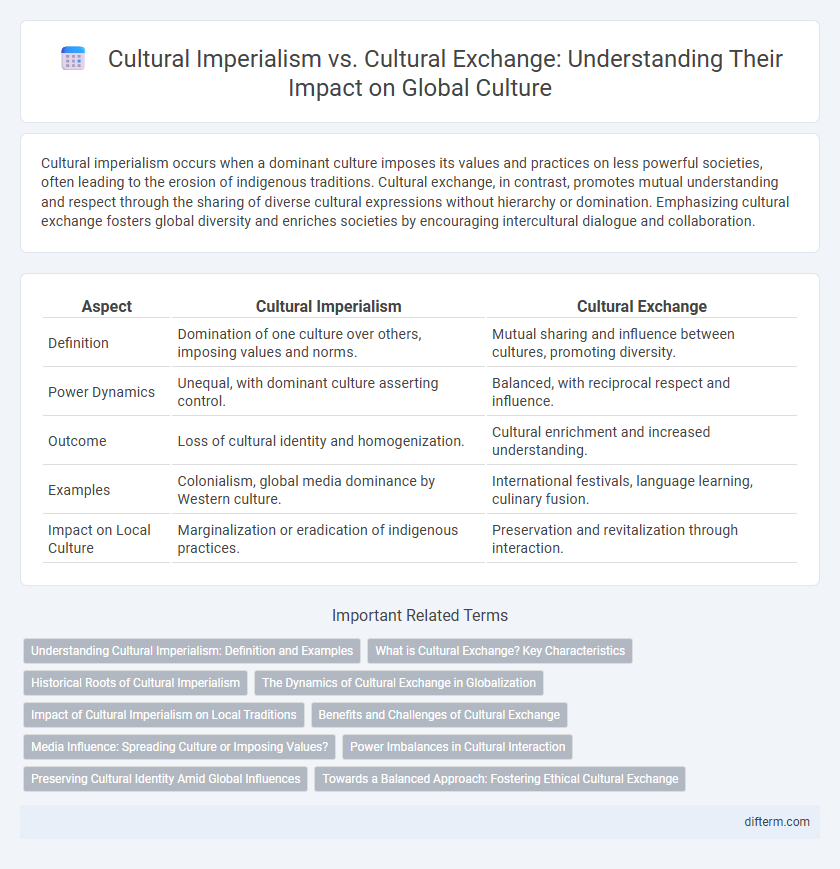Cultural imperialism occurs when a dominant culture imposes its values and practices on less powerful societies, often leading to the erosion of indigenous traditions. Cultural exchange, in contrast, promotes mutual understanding and respect through the sharing of diverse cultural expressions without hierarchy or domination. Emphasizing cultural exchange fosters global diversity and enriches societies by encouraging intercultural dialogue and collaboration.
Table of Comparison
| Aspect | Cultural Imperialism | Cultural Exchange |
|---|---|---|
| Definition | Domination of one culture over others, imposing values and norms. | Mutual sharing and influence between cultures, promoting diversity. |
| Power Dynamics | Unequal, with dominant culture asserting control. | Balanced, with reciprocal respect and influence. |
| Outcome | Loss of cultural identity and homogenization. | Cultural enrichment and increased understanding. |
| Examples | Colonialism, global media dominance by Western culture. | International festivals, language learning, culinary fusion. |
| Impact on Local Culture | Marginalization or eradication of indigenous practices. | Preservation and revitalization through interaction. |
Understanding Cultural Imperialism: Definition and Examples
Cultural imperialism refers to the dominance of one culture over others, often resulting in the imposition of values, customs, and media that overshadow local traditions. Examples include the global spread of American fast food, Hollywood movies, and English language media, which can marginalize indigenous cultures and languages. Understanding cultural imperialism is crucial for recognizing power dynamics in globalization and promoting more equitable cultural exchanges.
What is Cultural Exchange? Key Characteristics
Cultural exchange involves the mutual sharing and blending of traditions, languages, and values between different societies, promoting understanding and respect. Key characteristics include reciprocal communication, adaptation of cultural elements, and fostering of global interconnectedness without dominance or coercion. This process contrasts with cultural imperialism by emphasizing collaboration and equal influence rather than unilateral imposition.
Historical Roots of Cultural Imperialism
Cultural imperialism has its historical roots in colonial expansion, where dominant powers imposed their languages, customs, and ideologies upon indigenous populations, often erasing local cultures. This process was driven by economic and political motives, reinforcing power disparities between colonizers and the colonized. Understanding these origins highlights the contrast with cultural exchange, which is characterized by mutual influence and respect among diverse societies.
The Dynamics of Cultural Exchange in Globalization
Cultural exchange in globalization fosters mutual understanding by facilitating the sharing of traditions, languages, and arts across societies, enhancing cross-cultural empathy and cooperation. Unlike cultural imperialism, which imposes dominant values and erodes local identities, cultural exchange promotes reciprocal influence, preserving diversity while allowing cultures to adapt and evolve organically. The dynamics of this exchange are shaped by technology, migration, and international trade, creating a complex interplay that defines contemporary global cultural landscapes.
Impact of Cultural Imperialism on Local Traditions
Cultural imperialism often leads to the erosion of local traditions by imposing dominant cultural values, languages, and practices that overshadow indigenous customs. This suppression can result in the loss of unique cultural identities, traditional arts, and languages as global media and consumer culture promote homogenization. The impact is evident in many regions where cultural homogenization undermines cultural diversity and weakens community cohesion.
Benefits and Challenges of Cultural Exchange
Cultural exchange fosters mutual understanding and enriches societies through the sharing of traditions, languages, and ideas, promoting global interconnectedness and innovation. However, challenges such as cultural appropriation and unequal power dynamics can arise, risking the dilution or misrepresentation of native cultures. Successfully navigating these issues requires respectful dialogue and equitable participation to ensure that cultural exchange benefits all involved communities.
Media Influence: Spreading Culture or Imposing Values?
Media influence plays a critical role in shaping cultural perceptions by spreading dominant cultural narratives through films, television, and social media platforms, which can lead to cultural imperialism when local traditions and values are overshadowed or replaced. Conversely, media also facilitates cultural exchange by enabling diverse voices to share authentic stories, promoting mutual understanding and appreciation across global audiences. The balance between imposing values and fostering exchange depends largely on media ownership, content diversity, and audience agency in interpreting cultural messages.
Power Imbalances in Cultural Interaction
Cultural imperialism often results from power imbalances where dominant societies impose their values, language, and customs on less powerful groups, leading to cultural homogenization and loss of indigenous identities. In contrast, cultural exchange fosters reciprocal sharing and mutual respect, enabling diverse cultures to influence each other without coercion or domination. Recognizing power dynamics is crucial to promoting equitable cultural interactions that preserve cultural diversity and empower marginalized communities.
Preserving Cultural Identity Amid Global Influences
Cultural imperialism often threatens local traditions by imposing dominant cultural values, which can erode unique identities and homogenize diverse societies. In contrast, cultural exchange promotes mutual understanding and respects differences, allowing communities to adapt global influences while maintaining their distinct heritage. Preserving cultural identity requires intentional efforts to balance openness with protecting traditional practices in an increasingly interconnected world.
Towards a Balanced Approach: Fostering Ethical Cultural Exchange
Fostering ethical cultural exchange requires recognizing the power imbalances inherent in cultural imperialism while promoting mutual respect and reciprocity among diverse communities. Emphasizing dialogue, collaboration, and equitable representation helps preserve cultural identities and encourages authentic sharing of traditions, practices, and knowledge. Policies supporting cultural diversity and protection of indigenous rights are essential to achieving a balanced cultural interaction that enriches global understanding without exploitation.
Cultural imperialism vs Cultural exchange Infographic

 difterm.com
difterm.com